 It's a tough job but some tabloid has to do it. 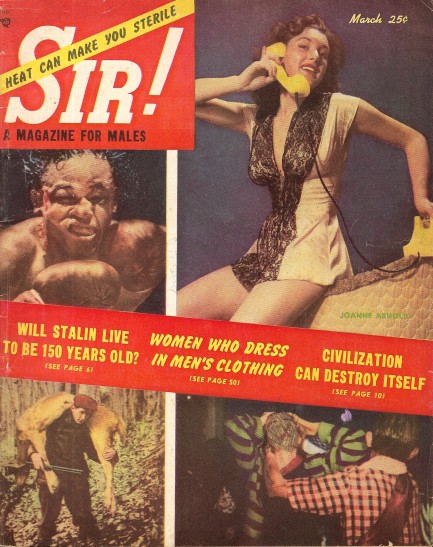
Above is the cover of a March 1953 issue of Sir! magazine, and in an example of the ephemeral nature of such items, shortly after we scanned this we spilled a glass of red wine on it. So behold! It's even more rare than it was when we bought it. Above the slash you see boxer Kid Gavilan, he of the famed bolo punch, and on the right is model Joanne Arnold, who we've featured before here, here, and here. She doesn't appear inside. But what you do get is a jaunt through such exotic locales as Melanesia, Tahiti, and Lisbon in search of knowledge and thrills.
We were drawn to the Lisbon story, which the magazine describes as a capital of sin. To us the word “sin” means late nights, good intoxicants, fun women, and excellent entertainment. To Sir! it means being cheated, robbed, framed, and arrested. To-may-to to-mah-to, we guess. We've spent some time in Lisbon and we love it. We don't know what it was like in 1953, but Europe was still coming out of World War II, which means many countries—even non-combatants like Portugal—were wracked by poverty. So we wouldn't be surprised if thieves were out in droves.
Elsewhere inside Sir! you get art from Jon Laurell and Joseph Szokoli, photos of model Jean Williams and Tahitian beauty queen Malie Haulani, a story on the danger of nuclear weapons, anthropological snobbery in exposés about New Caledonia and the Kogi people of Colombia, and fanciful theories about Russian scientists working to keep Josef Stalin alive for 150 years—which didn't work, because he died a mere five days after this issue of Sir! hit the newsstands. Clearly, the magazine is cursed. It certainly cursed our wine glass. We have thirty-five scans below for your enjoyment and other issues of Sir! here and here.
 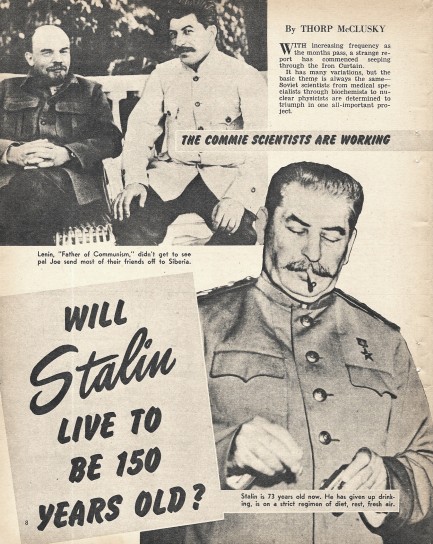    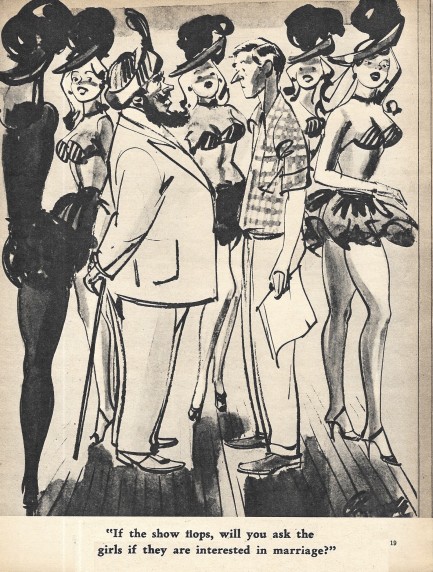 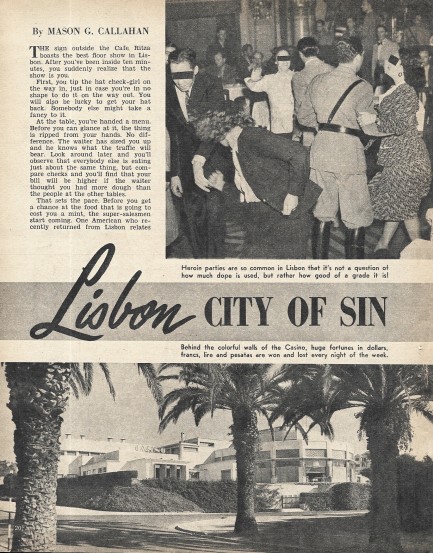  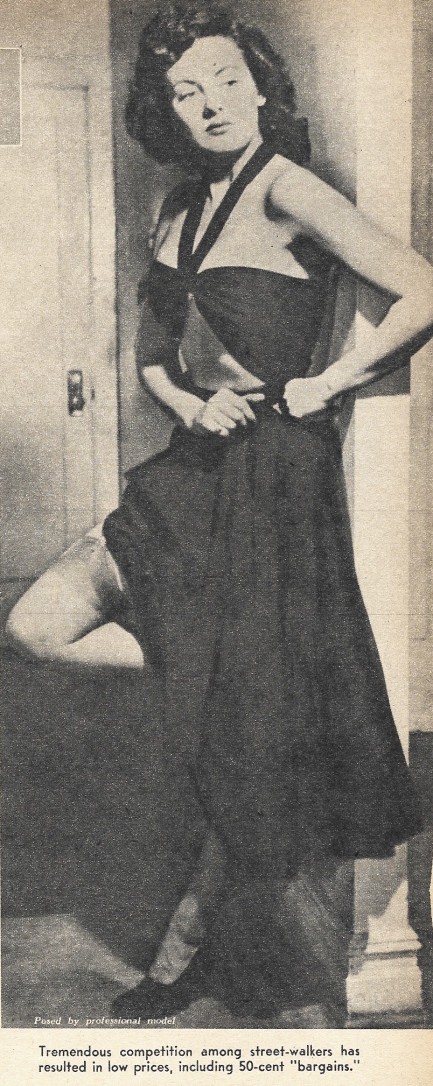 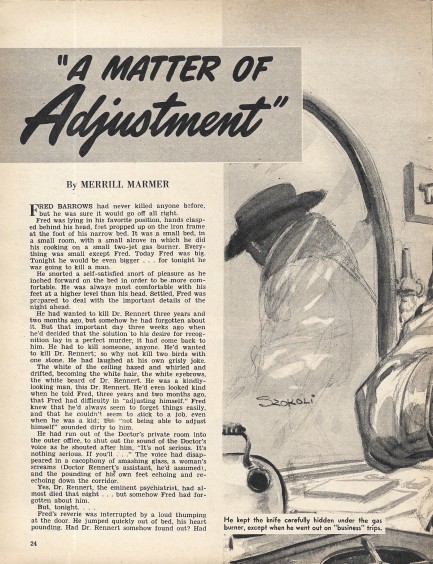 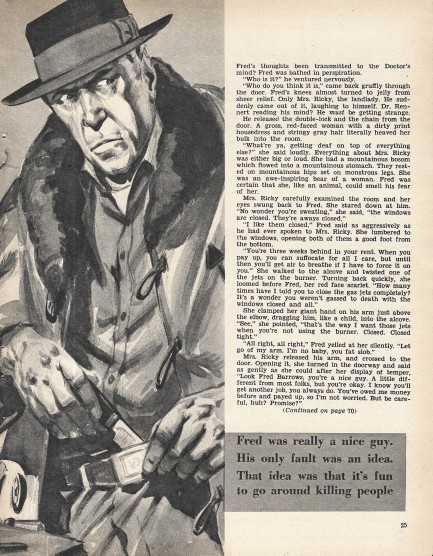   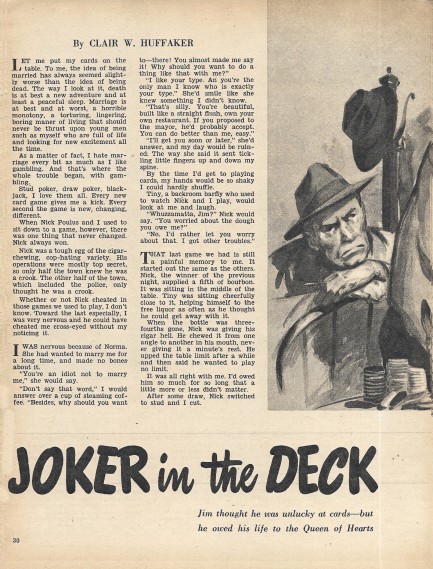 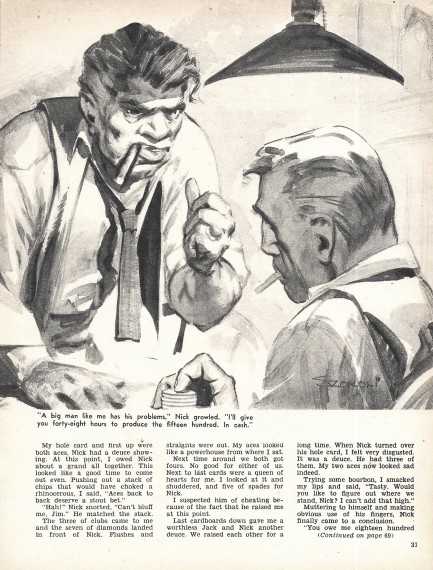       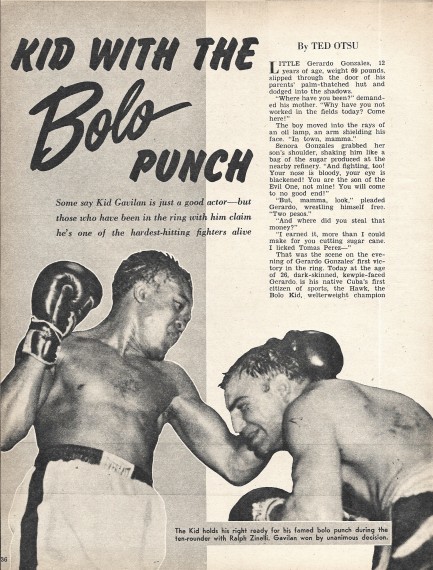 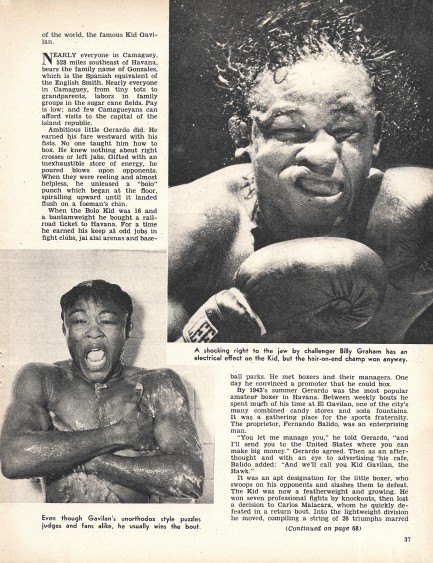  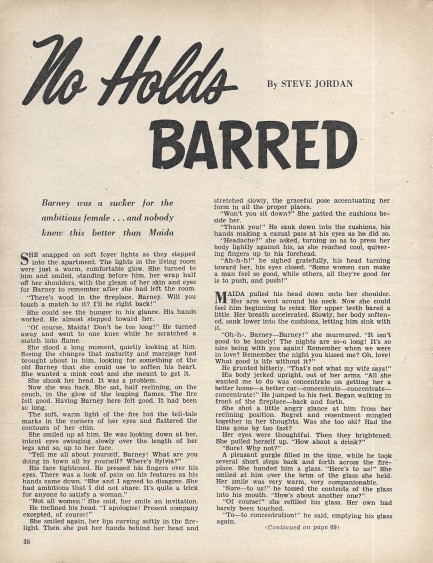 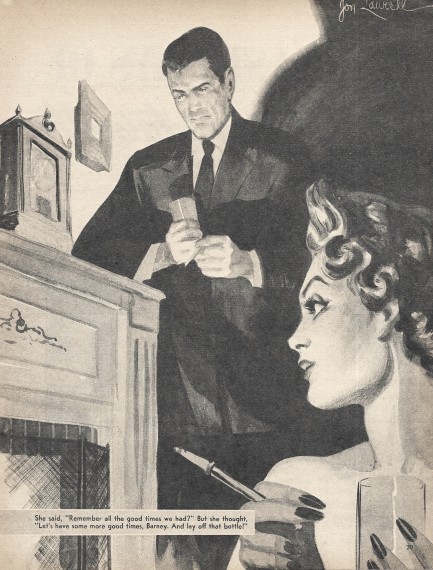 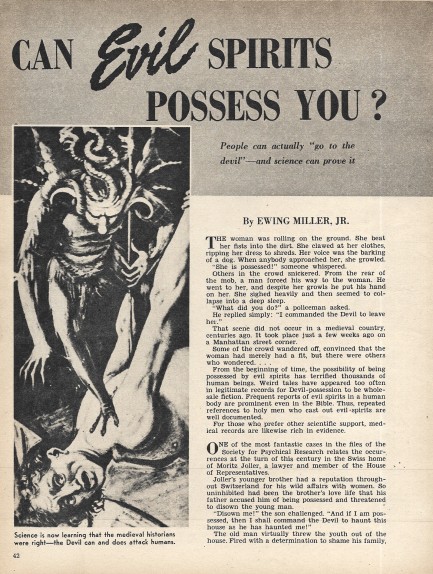 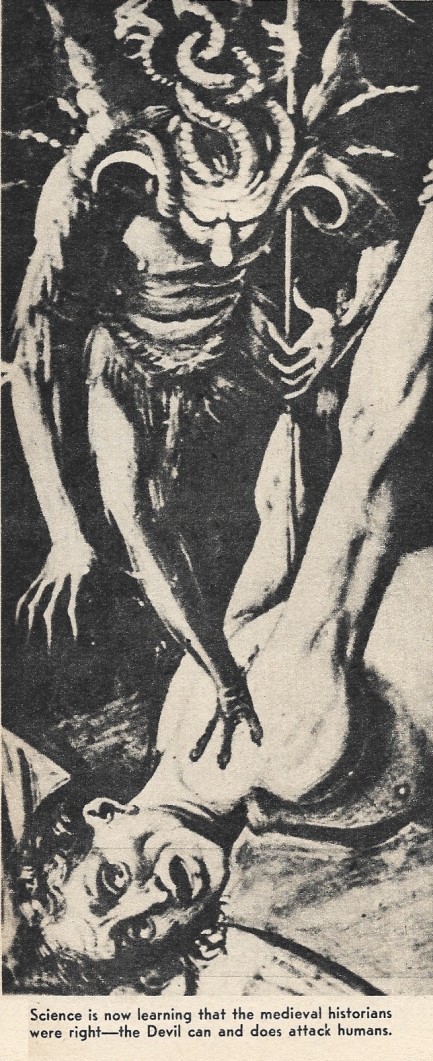 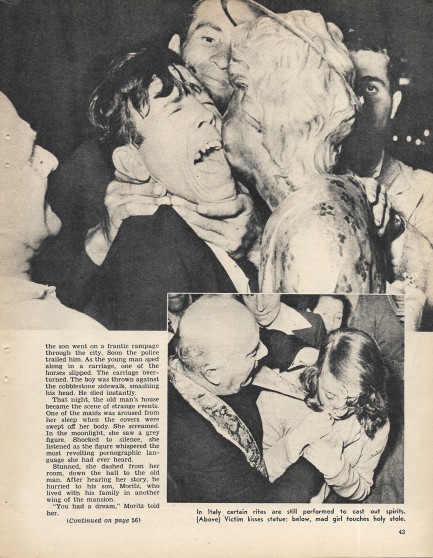 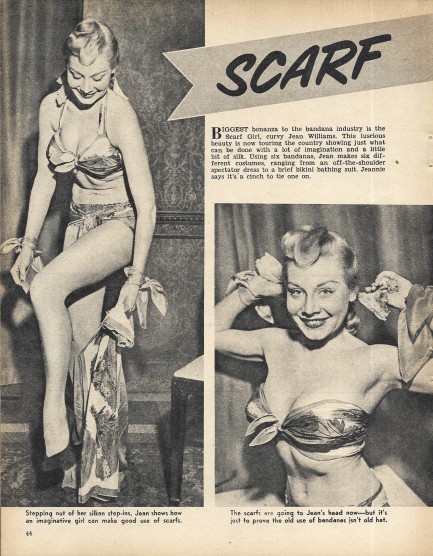 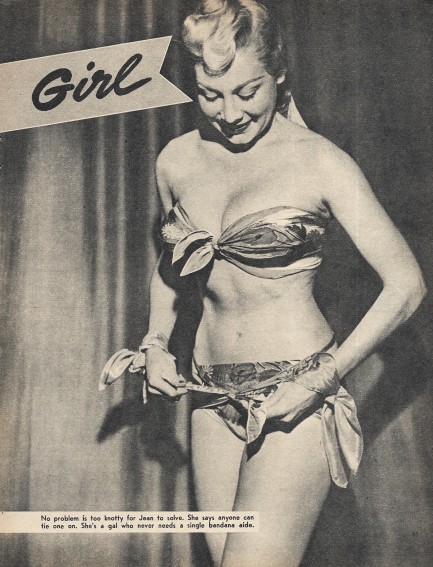 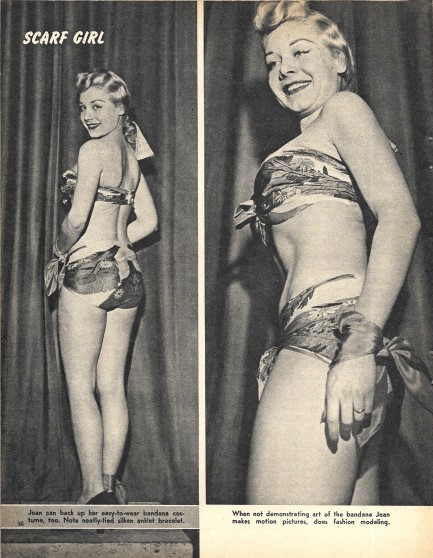 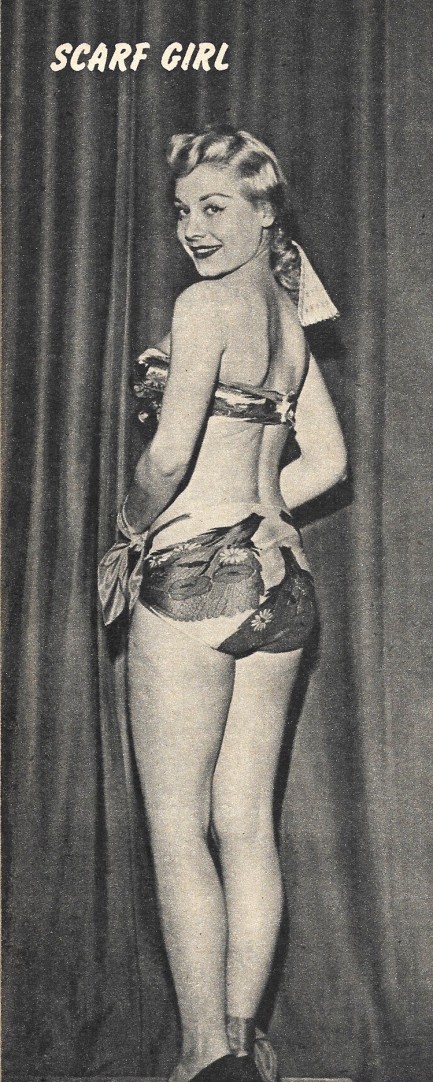  
 French painter Jacques Puiseux returns with another batch of pulp influenced contemporary art. 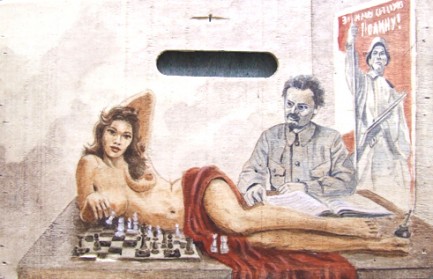
Last year we shared some unusual pulp influenced crate paintings from a French artist named Jacques Puiseux, and this morning we received more scans of his Marxist themed pieces via email. Last time we shared Puiseux’s work, we mentioned that we avoid posting modern art, and that’s true, but we didn’t want to leave you with the impression that we find it inferior to vintage art (if that were true we wouldn't bother to have a "Modern Pulp" category on the website). What we find inferior is modern promotional art—e.g., book covers, movie posters and the like. And obviously we find modern movies inferior, but then who doesn’t? However modern fine art is something we very much like, and more to the point, we like the relationship it has to the viewer. We aren’t art majors or anything, so bear with us while we try to explain ourselves. When it comes to classic art all the hard work is already done for you by the time you see it. You can go see Picasso’s blue portraits or Monet’s lilies or any run-of-the-mill Diego Rivera and know before you see it that you’re about to experience great art. But with contemporary art the viewer plays a role in deciding its ultimate worth. Certainly gallerists and museum curators have plenty of say, but the public is extremely important, and its influence can cut both ways. Sometimes, the public is wrong, as in the case of artists that never sold anything while alive, but whose flames were kept burning by critics and experts, eventually leading to a reevaluation of the work. Conversely, sometimes art is critically dismissed, but sustained public support brings about a reevaluation. That’s almost a description of the entire field of pulp art. So, while we glorify vintage art on this website, and in the case of promotional art we don’t think there’s any possible doubt that 99% of today’s efforts are just lame (maybe they should try letting actual artists do the work), we do like contemporary art, which means that when Jacques Puiseux sends us something that exhibits such a strong pulp influence we feel like we might as well throw it out there for you to have a gander at. It’s different from looking at a famous artist’s work—in this case, you actually have a say. And that’s the beauty of contemporary art. So at top is a piece featuring Leon Trotsky called “Embrouille à Tijuana,” just below is our favorite, “Fidèle-au-poste,” and under that are four more interesting efforts, including the last—“Tsar bomba.” For some context on that one, go here. 
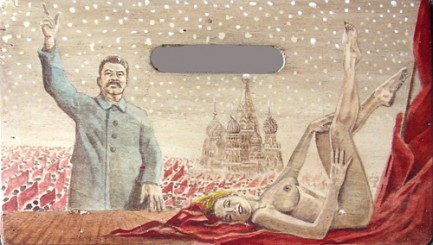
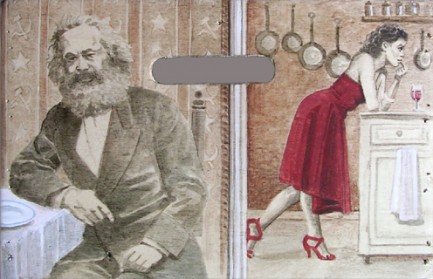


 Whisper shows it’s still happy to wallow in the muck. 
Hy Steirman’s Whisper magazine is generally considered to be less racy than when it was owned by Robert Harrison, but this issue from January 1959 shows a little of the old spark. It slams Elizabeth Taylor for stealing Eddie Fisher from Debbie Reynolds, with staff scribe Orson C. Green spewing forth this venom: But then Liz made clear to the whole world that beneath that lovely exterior there beats a heart of purest gall. She repaid the infinite kindness of her two friends by breaking up their marriage. Green goes on to describe Taylor trying to soak down New York’s Plaza   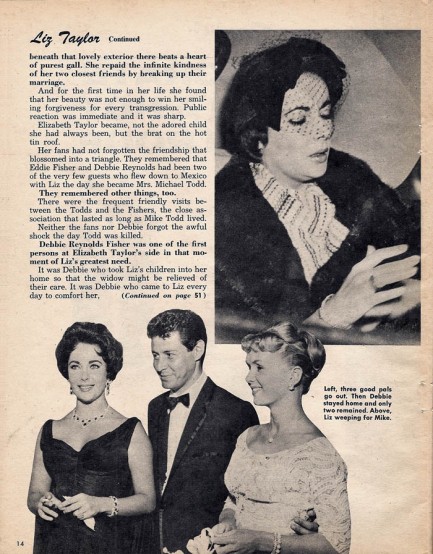 Hotel for two weeks of room charges, and then, when asked to pay, phoning up Montgomery Clift and getting him to help her trash the room. The article concludes: In short, Miss Taylor and friend Clift repaid [the Plaza] for its hospitality by deliberately making a mess for some forlorn chambermaid to clean up. Ingrate! Hotel for two weeks of room charges, and then, when asked to pay, phoning up Montgomery Clift and getting him to help her trash the room. The article concludes: In short, Miss Taylor and friend Clift repaid [the Plaza] for its hospitality by deliberately making a mess for some forlorn chambermaid to clean up. Ingrate!
Whisper also takes on ex-King Farouk I of Egypt—who was a favorite tabloid target of the time—describing him as “Fatso Farouk”, “the roly-poly playboy of the Nile”, “the balding balloon boy” and worse. Readers are told that he was at Maxim’s in Paris one night and saw Coccinelle do a song accompanied by a striptease that left her in only a beaded g-string. Farouk, who was famously amorous, was so smitten that he sent his card and a bouquet of flowers backstage. Coccinelle came to say thanks, and when asked by Farouk agreed to go to dinner. Moments after she left the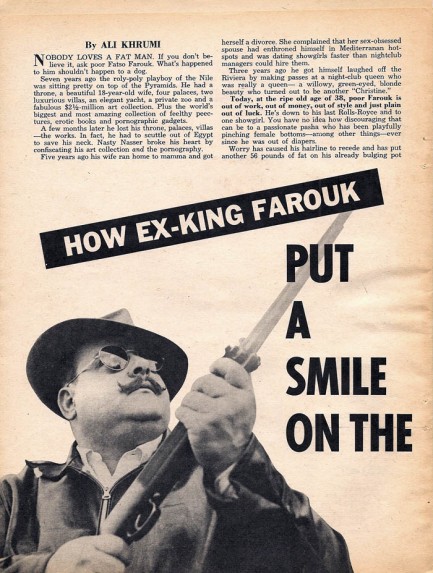 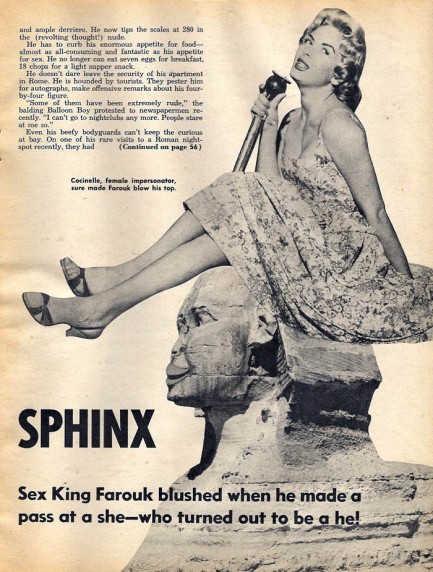 table one of the ex-king’s aide’s hastily scurried over and explained that Coccinelle had once been a man. Allegedly, Farouk flipped. Whisper describes overturned tables, broken bottles, the works. Readers are told: The whole Riviera rocked with laughter. The bulging butt of the joke fled to Rome. table one of the ex-king’s aide’s hastily scurried over and explained that Coccinelle had once been a man. Allegedly, Farouk flipped. Whisper describes overturned tables, broken bottles, the works. Readers are told: The whole Riviera rocked with laughter. The bulging butt of the joke fled to Rome. Whisper goes on to discuss sperm banks, state prisons, Vladimir Lenin, Josip Tito, and “white” slavery, but probably our favorite story is the one headlined: Do Ex-Prostitutes Make the Best Wives? A pertinent question. And whom did they get to write the answer? The byline says: by an Ex-Prostitute. We just love that. As far as whether Whisper gets any of its facts straight, we can’t really offer a guess, but this issue proves that even ten months after the sale from Harrison to Steirman, it hadn’t quite lost its spark. Things apparently went downhill pretty fast in the next few years, but we’ll judge that for ourselves as we examine more issues. Visit our entire Whisper collection by clicking its keyword at bottom. 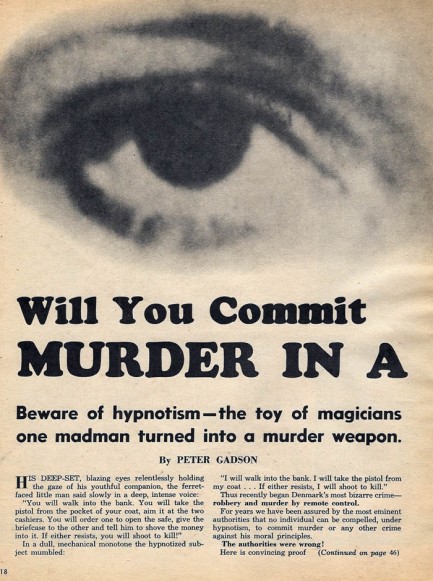 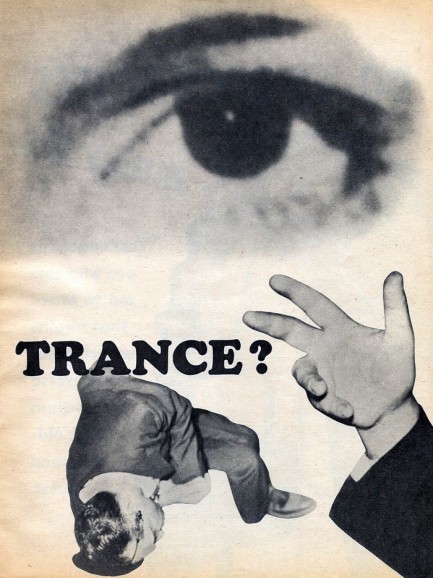 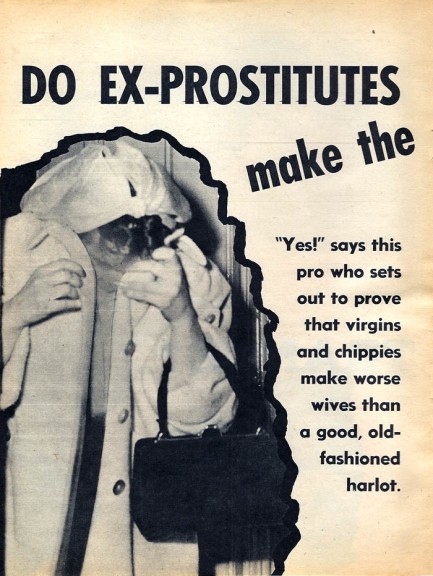 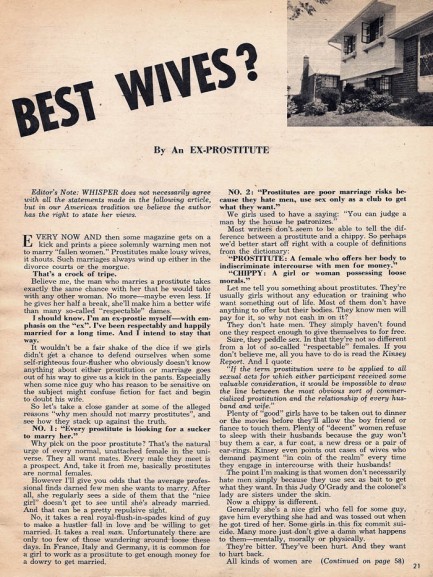 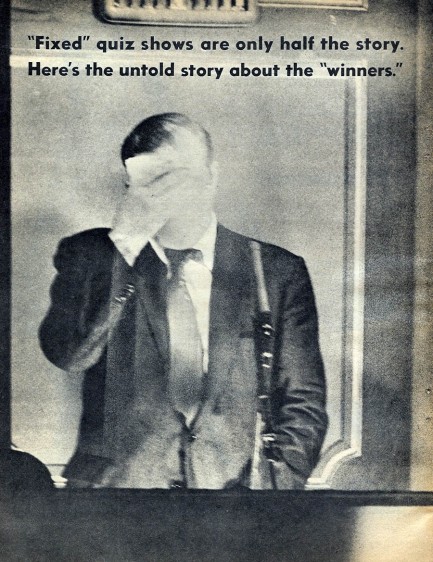 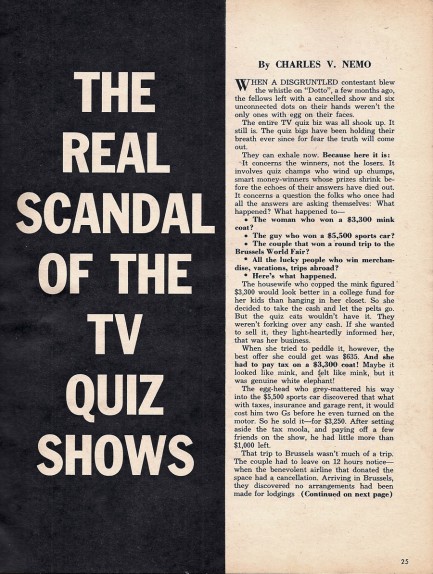  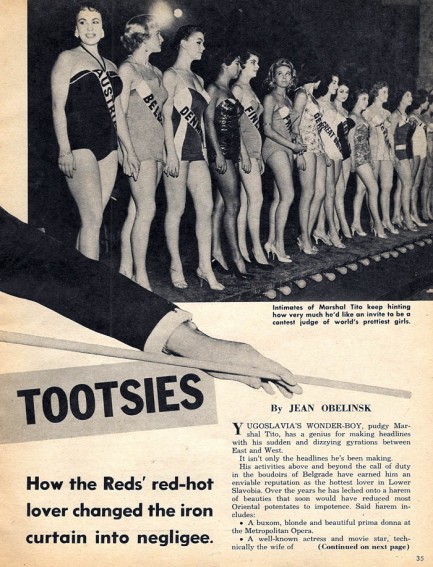 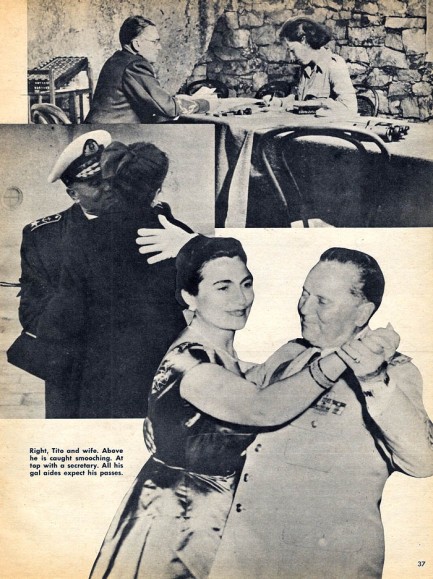  
|
 |

The headlines that mattered yesteryear.
2003—Hope Dies
Film legend Bob Hope dies of pneumonia two months after celebrating his 100th birthday. 1945—Churchill Given the Sack
In spite of admiring Winston Churchill as a great wartime leader, Britons elect
Clement Attlee the nation's new prime minister in a sweeping victory for the Labour Party over the Conservatives. 1952—Evita Peron Dies
Eva Duarte de Peron, aka Evita, wife of the president of the Argentine Republic, dies from cancer at age 33. Evita had brought the working classes into a position of political power never witnessed before, but was hated by the nation's powerful military class. She is lain to rest in Milan, Italy in a secret grave under a nun's name, but is eventually returned to Argentina for reburial beside her husband in 1974. 1943—Mussolini Calls It Quits
Italian dictator Benito Mussolini steps down as head of the armed forces and the government. It soon becomes clear that Il Duce did not relinquish power voluntarily, but was forced to resign after former Fascist colleagues turned against him. He is later installed by Germany as leader of the Italian Social Republic in the north of the country, but is killed by partisans in 1945.
|

|
|

It's easy. We have an uploader that makes it a snap. Use it to submit your art, text, header, and subhead. Your post can be funny, serious, or anything in between, as long as it's vintage pulp. You'll get a byline and experience the fleeting pride of free authorship. We'll edit your post for typos, but the rest is up to you. Click here to give us your best shot.

|
|

















































 Hotel for two weeks of room charges, and then, when asked to pay, phoning up Montgomery Clift and getting him to help her trash the room. The article concludes: In short, Miss Taylor and friend Clift repaid [the Plaza] for its hospitality by deliberately making a mess for some forlorn chambermaid to clean up. Ingrate!
Hotel for two weeks of room charges, and then, when asked to pay, phoning up Montgomery Clift and getting him to help her trash the room. The article concludes: In short, Miss Taylor and friend Clift repaid [the Plaza] for its hospitality by deliberately making a mess for some forlorn chambermaid to clean up. Ingrate!
 table one of the ex-king’s aide’s hastily scurried over and explained that Coccinelle had once been a man. Allegedly, Farouk flipped. Whisper describes overturned tables, broken bottles, the works. Readers are told: The whole Riviera rocked with laughter. The bulging butt of the joke fled to Rome.
table one of the ex-king’s aide’s hastily scurried over and explained that Coccinelle had once been a man. Allegedly, Farouk flipped. Whisper describes overturned tables, broken bottles, the works. Readers are told: The whole Riviera rocked with laughter. The bulging butt of the joke fled to Rome.














































































